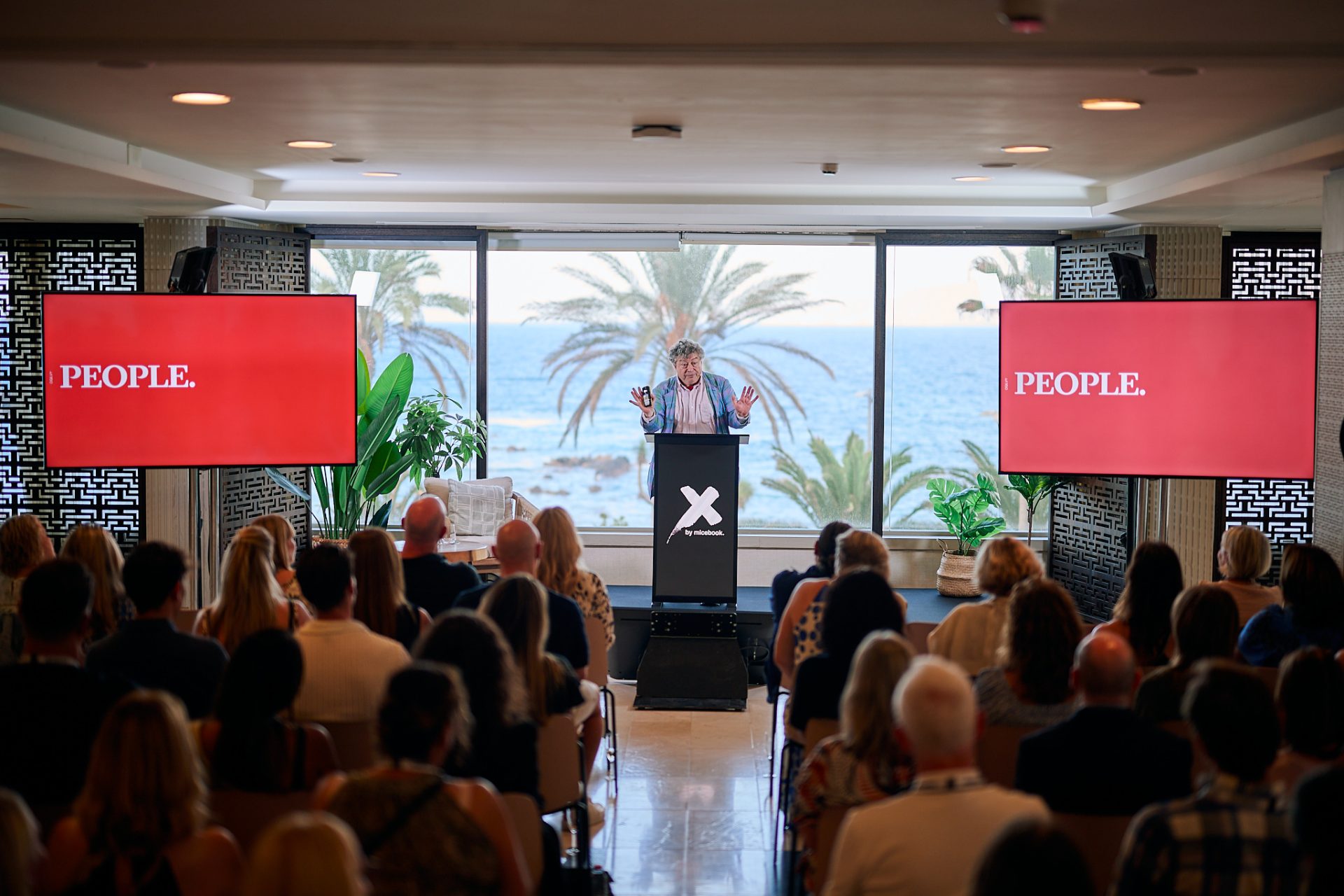Rory Sutherland, Vice Chairman of Ogilvy and one of the most influential voices in behavioural science and marketing, delivered a thought-provoking and characteristically witty keynote at the inaugural X: by micebook, challenging delegates to rethink how they design experiences.
In a talk that covered everything from speedometers to popsicle hotlines, he explored why emotion, perception, and human psychology matter far more than metrics when it comes to customer experience.
There were so many golden nuggets during the keynote – too many to mention – but here are our five key takeaways.
1. Feelings matter more than facts
“Most of the world is optimised for what is, not for how it feels.”
Rory opened with an observation on how we mostly design for what’s measurable, instead of what shapes how people feel. He illustrated this with the “feels like” temperature analogy and his idea of the “paceometer” that measures minutes per mile instead of miles per hour.
“There’s this fundamental problem in business, which is called quantification bias. We obsess about things we can measure, like time, but things like quality, enjoyment or perception, which we can’t measure easily, then just get ignored.”
In hospitality and events, the same principle applies: the goal isn’t just to move people efficiently, but to make them feel good while doing it. Experience design should focus on emotional temperature, not operational metrics.
2. Solve for anxiety, not just engineering
Using electric cars as an example, Sutherland argued it’s often cheaper and smarter to reduce anxiety than to engineer it away. Rather than building bigger batteries, reduce range anxiety through clearer communication and reassurance.
“Range anxiety has two facets, range, which is physics, and anxiety, which is psychology. It’s much cheaper to reduce anxiety than to increase range.”
He pointed out that many brands exacerbate anxiety by offering too much information, like battery percentages to the decimal point, instead of reassurance.
For event designers, this translates into addressing psychological pain points – anticipation, uncertainty, boredom – not just operational ones. Sometimes, the smartest investment isn’t in new tech or more speed, but in reducing uncertainty.
3. The power of the unexpected
“It’s the things people weren’t expecting that they remember and talk about.”
One of the recurring themes in the keynote was discretionary generosity – those small, unexpected gestures that spark joy and stick in the memory. Our brains are “like JPEGs” according to Sutherland, they notice what’s unexpected and ignore what’s predictable. That’s why surprises carry such emotional power.
DoubleTree’s warm cookie at check in. A phone by a pool at the Magic Castle Hotel that connects to a “Popsicle Hotline.” Or a lift that lets you choose your own music. These are moments of joy that guests retell and remember.
While finance teams might view these as “non-essential costs,” they’re what make experiences meaningful, memorable, and shareable. And discretionary generosity doesn’t have to be expensive, just imaginative and different. A handwritten note, a personal welcome, or a small indulgence can transform an experience.
4. Reverse benchmarking beats copycat thinking
“If everyone is copying everyone else, no one stands out.”
Most businesses benchmark against competitors, which breeds sameness. Sutherland urged the audience to try reverse benchmarking, focusing on what others neglect rather than what they do well.
He shared stories from Michelin-starred restaurants, gyms, hotels, even gas stations, all of which achieved success by excelling in areas competitors ignored like bathroom design or good coffee.
For example, Unreasonable Hospitality author Will Guidara, who turned 11 Madison Park into the world’s best restaurant by focusing on two things – providing the best coffee and beer. “They didn’t copy what everyone else did brilliantly. They doubled down on what everyone else did badly.”
“When everyone is doing the same stupid thing, you’ll never get blamed for copying them — but you’ll also never stand out.”
5. Relationships Trump Transactions
Finally, Sutherland contrasted relational versus transactional capitalism. The best customer experiences, he argued, are built on trust, generosity, and long-term relationships, not short-term efficiency.
“A really good personal experience can be worth more than millions in brand advertising.”
He told the story of a Caribbean hotel that quietly paid local taxi drivers to signal when a guest was a repeat visitor, allowing staff to greet them with “Welcome back.” That one word, “back” he said, “meant so much.”
In a world of automation and algorithms, he warned, the danger is we design out the very things that make experiences memorable – surprise, generosity, and the feeling that someone genuinely cares. That’s a timely reminder for our industry that it’s not about doing things cheaper, it’s about doing things more humanly.
Sutherland left the audience with one final thought: “Rather than trying to change the world, change how people see the world — and when they see the world differently, they behave differently.”
Huge thanks to Rory Sutherland for being so generous with his time and helping to make the first X: by micebook an experience to remember.

